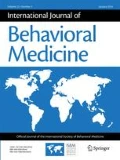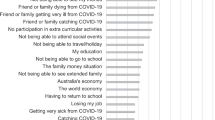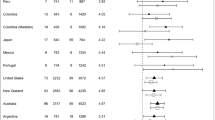Abstract
Background
Numerous studies conducted within the USA demonstrate higher levels of benefit finding in ethnic minority individuals compared to nonminority individuals living with chronic disease.
Purpose
As benefit finding may be a salient buffer for the effects of stress, the current study examined the association between perceived stress and benefit finding in human immunodeficiency virus (HIV)+ men who have sex with men (MSM) living in the southeast USA and investigated whether ethnicity was a moderator of this relationship. We hypothesized that benefit finding would be greater in ethnic minority MSM than in white MSM and that ethnic minority MSM with high levels of stress would experience greater benefit finding than their white MSM counterparts.
Method
The current study utilized baseline (T1) and 3-month follow-up (T2) data drawn from a previous trial of a psychosocial intervention in HIV+ MSM. Participants were 130 HIV+ MSM; 52 % were white and 48 % belonged to minority ethnic groups (African-American, Caribbean-American, Hispanic).
Results
Analyses revealed that benefit finding was greater in ethnic minority MSM at baseline; however, this difference became nonsignificant when age, education level, highly active antiretroviral therapy adherence, and CD4 count were added to the model. Moderated regression analyses revealed a significant interaction between T1 perceived stress and ethnicity in predicting T2 benefit finding, such that higher levels of T1 perceived stress predicted lower levels of T2 benefit finding in ethnic minority MSM only. This association was independent of intervention group assignment.
Conclusion
The current study's results highlight potential differences in the relationship between stress and benefit finding processes in white and ethnic minority HIV+ MSM.

Similar content being viewed by others
References
Schackman BR, Gebo KA, Walensky RP, Losina E, Muccio T, Sax PE, et al. The lifetime cost of current human immunodeficiency virus care in the United States. Med Care. 2006;44(11):990–7.
Miller G, Chen E, Cole SW. Health psychology: developing biologically plausible models linking the social world and physical health. Annu Rev Psychol. 2009;60:501–24.
Chu C, Selwyn PA. Current health disparities in HIV/AIDS. AIDS Read. 2008;18:144–53.
Antoni MH. Stress management and psychoneuroimmunology in HIV infection. CNS Spectrums. 2003;8(1):40–51.
Leserman J. The effects of depression, stressful life events, social support, and coping on the progression of HIV infection. Current Psychiatry Reports. 2000;2:495–502.
Ironson G, Hayward HS. Do positive psychosocial factors predict disease progression in HIV-1? A review of the evidence. Psychosomatic Med. 2008;70:546–54.
Bower JE, Moskowitz JT, Epel E. Is benefit finding good for your health? Pathways linking positive life changes after stress and physical health outcomes. Curr Dir Psychol Sci. 2009;18(6):337–41.
Lechner SC, Weaver KE. Lessons learned about benefit finding among individuals with cancer or HIV/AIDS. In: Park CL, Lechner SC, Antoni MH, Stanton AL, editors. Medical illness and positive life change: can crisis lead to personal transformation? Washington: American Psychological Association; 2009. p. 107–24.
Park CL, Lechner SC, Antoni MH, Stanton AL. Medical illness and positive life change: can crisis lead to personal transformation? Washington: American Psychological Association; 2009. p. 107–24.
Epel E, McEwen B, Ickovics J. Embodying psychological thriving: physical thriving in response to stress. J Soc Issues. 1998;54:301–22.
Siegel K, Schrimshaw EW. The stress moderating role of benefit finding on psychological distress and well-being among women living with HIV/AIDS. AIDS Behav. 2007;11:421–33.
Luszczynska A, Sarkar Y, Knoll N. Received social support, self-efficacy, and finding benefits in disease as predictors of physical functioning and adherence to antiretroviral therapy. Patient Educ Couns. 2007;66(1):37–42.
Mols F, Vingerhoets AJ, Coebergh JW, van de Poll-Franse LV. Well-being, posttraumatic growth and benefit finding in long-term breast cancer survivors. Psychol Health. 2009;24(5):583–95.
Chien TW, Wang WC, Chien CC, Hwang WS. Rasch analysis of positive changes following adversity in cancer patients attending community support groups. Psychooncology. 2011;20(1):98–105.
Centers for Disease Control and Prevention. National Center for HIV/AIDS, Viral Hepatitis, Sexually Transmitted Diseases, and Tuberculosis Prevention Assessment. HIV among gay, bisexual and other men who have sex with men (MSM). Atlanta: US Department of Health and Human Services; 2010.
Hall HI, Byers RH, Ling Q, Espinoza L. Racial/ethnic and age disparities in HIV prevalence and disease progression among men who have sex with men in the United States. Am J Public Health. 2007;97:1060–6.
Centers for Disease Control and Prevention. National Center for HIV/AIDS, Viral Hepatitis, Sexually Transmitted Diseases, and Tuberculosis Prevention Assessment. Highlights of CDC activities addressing HIV prevention among African American gay, bisexual, and other men who have sex with men. Atlanta: US Department of Health and Human Services; 2011.
Hightow-Weidman LB, Jones K, Wohl AR, Futterman D, Outlaw A, Phillips 2nd G, et al. Early linkage and retention in care: findings from the outreach, linkage, and retention in care initiative among young men of color who have sex with men. AIDS Patient Care STDS. 2011;25:S31–8.
Hightow-Weidman LB, Phillips 2nd G, Jones KC, Outlaw AY, Fields SD, Smith JC, et al. Racial and sexual identity-related maltreatment among minority YMSM: prevalence, perceptions, and the association with emotional distress. AIDS Patient Care STDS. 2011;25:S39–45.
Bellizzi KM, Smith AW, Reeve BB, Alfano CM, Bernstein L, Meeske K, et al. Post-traumatic growth and health-related quality of life in a racially diverse cohort of breast cancer survivors. J Heal Psychol. 2010;15:615–26.
Bower JE, Meyerowitz BE, Desmond KA, Bernaards CA, Rowland JH, Ganz PA. Perceptions of positive meaning and vulnerability following breast cancer: predictors and outcomes among long-term breast cancer survivors. Annals of Behavioral Med. 2005;29(3):236–45.
Siegel K, Schrimshaw EW, Pretter S. Stress-related growth among women living with HIV/AIDS: examination of an explanatory model. Journal of Behavioral Med. 2005;28(5):403–14.
Milam JE. Posttraumatic growth among HIV/AIDS patients. J Appl Soc Psychol. 2004;34(11):2353–76.
Weaver, KE. Assessing positive growth from the experience of chronic illness: a measurement model of benefit-finding in breast cancer, prostate cancer, and HIV/AIDS. 2006. Unpublished doctoral dissertation. University of Miami, Coral Gables, FL.
Urcuyo KR, Boyers AE, Carver CS, Antoni MH. Finding benefit in breast cancer: relations with personality, coping, and concurrent well-being. Psychol Heal. 2005;20(2):175–92.
Helgeson VS, Reynolds KA, Tomich PL. A meta-analytic review of benefit finding and growth. J Consult Clin Psychol. 2006;74(5):797–816.
Meyer IH. Prejudice, social stress, and mental health in lesbian, gay, and bisexual populations: conceptual issues and research evidence. Psychol Bull. 2003;129(5):674–97.
Consolacion TB, Russell ST, Sue SS. Sex race/ethnicity, and romantic attractions: multiple minority status adolescents and mental health. Cultur Divers Ethnic Minor Psychol. 2004;10(3):200–14.
Power C, Selnes O, Grim J, McArthur J. HIV dementia scale: a rapid screening test. Journal of Acquired Immune Deficiency Syndrome. 1995;8:273–8.
First MB, Spitzer RL, Gibbon M, Williams JBW. Structured clinical interview for DSM-IV axis I disorders (SCID-I). Washington: American Psychiatric Press; 1997.
Antoni MH, Carrico AW, Durán RE, Spitzer S, Penedo F, Ironson G, et al. Randomized clinical trial of cognitive behavioral stress management on human immunodeficiency virus viral load in gay men treated with highly active antiretroviral therapy. Psychosomatic Med. 2006;68(1):143–51.
Chesney MA, Ickovics JR, Chambers DB, Gifford AL. Self-reported adherence to antiretroviral medications among participants in HIV clinical trials: the AACTG adherence instruments. AIDS Care. 2000;12:255–66.
Cohen S, Kamarck T, Mermelstein R. A global measure of perceived stress. J Heal Soc Behav. 1983;24:385–96.
Antoni MH, Lehman JM, Kilbourn KM, Boyers AE, Culver JL, Alferi SM. Cognitive-behavioral stress management intervention decreases the prevalence of depression and enhances benefit finding among women under treatment for early-stage breast cancer. Heal Psychol. 2001;20:20–32.
Tomich PL, Helgeson VS. Is finding something good in the bad always good? Benefit finding among women with breast cancer. Heal Psychol. 2004;23:16–23.
Rubin DB. Multiple imputation for non-response in surveys. New York: Wiley; 1987.
Holmbeck G. Post-hoc probing of significant moderational and mediational effects in studies of pediatric populations. J Pediatr Psychol. 2002;27(1):87–96.
Milam J. Posttraumatic growth and HIV disease progression. J Consult Clin Psychol. 2006;74(5):817–27.
Brooks RA, Etzel MA, Hinojos E, Henry CL, Perez M. Preventing HIV among Latino and African American gay and bisexual men in a context of HIV-related stigma, discrimination, and homophobia: perspectives of providers. AIDS Patient Care and STDs. 2005;19(11):737–44.
Swendeman D, Rotheram-Borus MJ, Comulada S, Weiss R, Ramos ME. Predictors of HIV-related stigma among young people living with HIV. Heal Psychol. 2006;25(4):501–9.
McGregor BA, Antoni MH, Boyers A, Alferi SM, Blomberg BB, Carver CS. Cognitive-behavioral stress management increases benefit finding and immune function among women with early-stage breast cancer. J Psychosom Res. 2004;56:1–8.
Penedo F, Molton I, Dahn JR, Shen BJ, Kinsinger D, Traeger L, et al. A randomized clinical trial of group-based cognitive–behavioral stress management in localized prostate cancer: development of stress management skills improves quality of life and benefit finding. Annals of Behavioral Med. 2006;31(3):261–70.
Acknowledgments
This research was supported primarily by the University of Miami Biopsychosocial Research Training in Immunology and AIDS Grant, 5T32MH018917-24.
Author information
Authors and Affiliations
Corresponding author
Rights and permissions
About this article
Cite this article
Seay, J.S., Fekete, E.M., Antoni, M.H. et al. Ethnicity Moderates the Relationship Between Perceived Stress and Benefit Finding in HIV+ Men Who Have Sex with Men (MSM). Int.J. Behav. Med. 21, 266–274 (2014). https://doi.org/10.1007/s12529-013-9305-2
Published:
Issue Date:
DOI: https://doi.org/10.1007/s12529-013-9305-2




